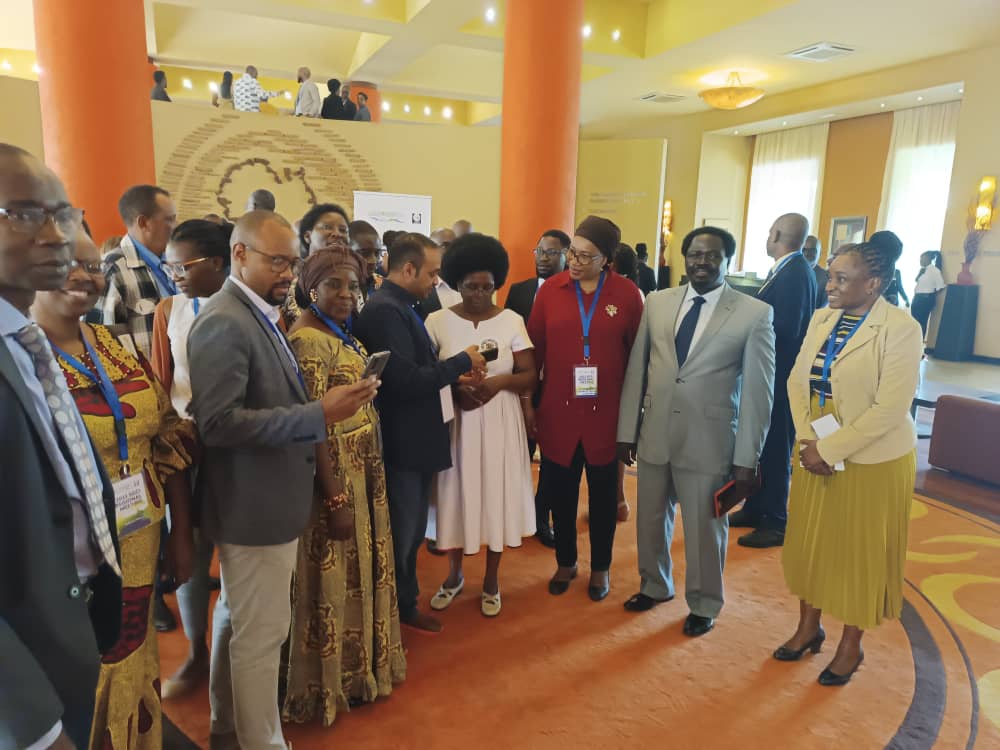By Edwin Naidu
Uganda has made considerable progress over the past three decades, but there is a growing need for highly qualified research and development staff who can contribute beyond the tertiary education sector and benefit society at large, according to its national research outlook report released in Kampala.
The report, Unlocking Uganda’s Research Potential for Long-Term Development and Prosperity, was launched by Dr Monica Musenero Masanza, the minister for science, technology and innovation, in Kampala.
She told delegates from across the continent on 21 June that one needed no reminding of the importance of science in shaping a better world, especially in addressing poverty and underdevelopment.
“This is not the science of conferences. We want to be judged by its impact on development … if COVID-19 didn’t wake you up, then take this conference as a wake-up call,” said Masanza.
Emphasising the importance of science, the minister challenged delegates to start thinking about their work differently – instead of being adopters; they have to understand and clearly define their purpose, establish systems to ensure delivery; and align funding to practical outputs.
Speaking at a week-long regional meeting of the Science Granting Councils Initiative (SGCI) and the launch of the National Research Outlook Report for Uganda, Masanza’s message was that there is a need to produce research that has an impact on Uganda and the continent.
Growth in researchers
The report, produced by the Uganda National Council for Science and Technology, noted that the number of researchers in Uganda has continued to grow over the past 30 years because of the establishment of a robust research quality assurance system with a global reputation for research excellence.
But only two institutions in Uganda, Makerere University and the Mbarara University of Science and Technology, have been ranked internationally for their research and innovation. Uganda ranked 119 in the Global Innovation Index (out of 132 countries).
The report also provides insight into the country’s science, technology and innovation landscape, revealing that Uganda has about 0.04 full-time equivalents or people working in full-time research.
According to UNESCO, Uganda has a low number of researchers relative to its population. The country hosts 26 research and development, or R&D, personnel per million inhabitants. The proportion of researchers (29.8 per million), is also significantly lower compared to the average reported for Africa (95.1 researchers per million).
In 2018, UNESCO data reported that 48.3% of Ugandan researchers were employed in higher education (rising from 46% in 2014), and a further 47.1% of researchers were employed by government ministries, departments and agencies. The remaining researchers were in the business and non-profit sectors.
Most of Uganda’s researchers are found in universities, in contrast to the high-performing economies whose researchers are primarily found in business enterprises.
Because 75% of employment in Uganda is in primary sectors, where little value addition is done, this reality is reflected in the exhibited limited propensity to undertake research.
Women in research
According to the report, doctorate holders are also a catalyst for engaging in international collaborative research. Still, there is a need for more PhD holders, with estimates of about 2,000 PhD holders needed in both higher education and other sectors.
In a population of 45.8 million people, the ratio is one PhD holder to 22,000 people.
Nevertheless, there has been an increasing trend in the number of PhDs being produced or trained, although doctoral education and training in Uganda remains male-dominated.
Only 29.8% of Ugandan researchers are female – below the average in Africa of 31%.
Of the 1,025 PhDs awarded by public universities between 1970 and 2020, only 240 (23.4%) were female, and 68.1% were in STEM, or science, technology, engineering and mathematical, fields. In addition, of the 172 PhDs awarded by private universities between 2001 and 2020, only 42 (24.4%) were females, and only 11% were in STEM fields.
The role of science councils
During the meeting, the role of science councils in strengthening scientific endeavours was a key discussion point.
The Science Granting Councils Initiative, or SGCI, aims to strengthen the capacities of Science Granting Councils (SGCs) in Sub-Saharan Africa to support research and evidence-based policies that will contribute to economic and social development.
The SGCI is jointly funded by the United Kingdom’s Foreign, Commonwealth and Development Office, Canada’s International Development Research Centre, the Norwegian Agency for Development Cooperation, the Swedish International Development Cooperation Agency, the German Research Foundation, or DFG, and South Africa’s National Research Foundation, which were represented at this meeting.
Present were representatives of granting councils from Botswana, Burkina Faso, Côte d’Ivoire, Ethiopia, Ghana, Kenya, Malawi, Mozambique, Namibia, Senegal, Sierra Leone, Tanzania, Zambia, Zimbabwe and Uganda; Collaborative Technical Agencies of the SGCs, namely the South African Research and Innovation Association, the University of Johannesburg, the African Centre for Technology Studies, the Centre for Agriculture and Bioscience International, or Scidev.net, the Human Sciences Research Council of South Africa, the African Technology Policy Studies; and, from Uganda, policymakers, research institutions, higher education institutions, and members of the private sector, industry and the media, among others.
Martin P Ongol, the acting executive secretary for the Uganda National Council for Science and Technology, said science, technology, and innovation (STI) would play a critical role in Uganda’s socio-economic transformation, especially during this era of rapid global technological advancements, alongside new and emerging challenges.
With Uganda’s vision to achieve middle-income status by 2030, the country has to accelerate technology-driven approaches to strengthen its import-substitution strategy and build a solid human capital base.
“I am confident that this report will catalyse new conversations and spur fundamental reforms across our vast STI system to ensure that no Ugandan is left behind in our country’s transformative journey,” he said.
Strengthening grant management
Professor Samuel Baker Kucel, a member of the governing board of the Uganda National Council for Science and Technology, read out a speech on behalf of the chairperson of the board, Dr Theresa Sengooba, who could not attend.
“Much has been achieved to date, including digitalisation of research and grant management systems of granting councils, and I am happy to inform you that our very own systems at the Uganda National Council for Science and Technology have been widely benchmarked and adopted by the SGCI.”
Through this initiative, several knowledge products for capacity-building and strengthening science ecosystems, such as frameworks for professionalising research management and certification of research managers, have been designed and deployed to build capacities among network partners.
According to Sengooba, at a global level, the science and technology outlook is shaped by various critical issues that significantly impact societies, economies and the overall progress of humanity.
Key among these is the urgent need to address climate change, reduce greenhouse gas emissions, and adopt sustainable practices; the rapid advancement of artificial intelligence and automation technologies and their attendant opportunities and challenges (ethics and job losses); digital transformation; as well as health and biotechnology.
Echoing the minister, Sengooba said the COVID-19 pandemic underscored the importance of global health preparedness and the role of science and technology in addressing public health crises.
“This report offers a comprehensive assessment of the research landscape and insights on progress, challenges and achievements in lieu of our context. I believe this report will inform, enrich and generate debate that will shape our thinking as we develop implementation plans for SGCI going forward.”
This article was published on the University World News Africa site





